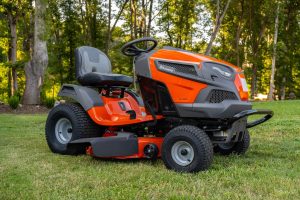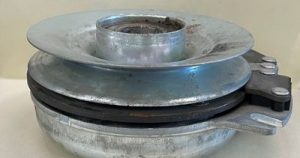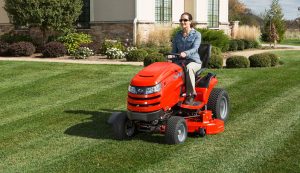Are Kubota Zero-Turn Mowers Good? The Good, The Bad, and The Ugly
The Kubota company has a long well-known history of manufacturing quality cast iron products since the late 1800s and has dutifully retained that virtue in the production of their zero-turn mowers, which will explain why the mowers are on the pricey side. However, when you’re dealing with zero-turn mowers, a durable frame alone doesn’t guarantee an enjoyable mowing experience.
For what it’s worth, Kubota zero-turn mowers are recognized as one of the best quality zero-turn mowers in the market with the nicest perks on even their low-grade residential models offering great satisfaction to all tiers of consumers.
Although the Kubota zero-turn mowers are acknowledged as a decent brand, are they really any good for you? At the end of the day, it sizzles down to what’s best for you, and that is the reason for this article. Let’s dive!
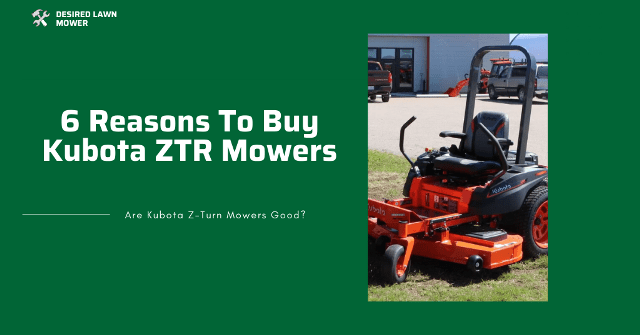
Table of Contents
6 Reasons Why Kubota Zero-Turn Mowers Are Good
For a zero-turn mower to be worth the money, it should be able to provide you with the basic lawn tending requirements without costing your peace of mind:
1.Terrific Frame Quality
Kubota zero-turn mowers will last you a lifetime if maintained properly. Nothing like drawing back from ruggedly long grass blades or bushes to avoid wrecking the deck or bumping into a hidden obstacle, Kubota z-turns will effortlessly thrash through the curtains of grass and out without a scratch in sight. Every part of the machine is built to resist the toughest situations allowing you to enjoy your mowing machine for as long as you need.
2.Impressive Deck Type, Sizes, And Cut Quality
Kubota zero-turn mowers are equipped with 10-gauge fabricated or welded steel decks with the PRO deck aerodynamic cutting feature that offers a wider shaft for premium airflow and cutting efficiency. This allows the blades to properly slice through green obstacles with ease ultimately enhancing the cut quality of your lawn, with no stragglers or turf tear. This rather small but clever detail will reduce the workload for you and your mower, saving you an eternity of mowing, expense on gas, and at the same time exaggerating the lifespan of your zero-turn mower. In some cases for z-turns, it’s really the little things that make big differences.
The deck sizes for your Kubota z-turn will depend on the model or grade you seek to buy; for the low-grade residential models, deck sizes range from 42-54 inches, 48-60 inches for the high-grade residential, and 54-72 for the commercial grade models. With zero-turn mowers, you can’t customize enough. Having a variety of deck options gives you a chance to suitably match your mower to your lawn and I highly commend the brand for possessing this quality.
3.Efficient Power Supply
Kubota zero-turn mowers are turf-hungry machines and are properly equipped with enough power for the craziest mowing jobs out there suited for both professional and tough residential jobs. Engine types range from Kawasaki, and Kohler, to Briggs and Stratton’s motors offering 21 – 36.9 horsepower. You have the lower-end residential models crackling with 21 – 25 horsepower, the higher-end residential models with 22 – 24 horsepower, and the commercial grade models from 21.1 – 36.9 horsepower respectively which is more than enough if you’re either a residential or a commercial landscaper.
4.Maneuverability & Speed
Smooth steering accentuates the overall ease of use of the machine. Since you wouldn’t have to struggle to maneuver the zero-turn mower around the yard, you save a lot of time and labor for the remainder of your day. Kubota ZTRs are also recognized for being equipped with in-house transmission systems which are tailored to perfectly fit this brand of mowers giving rise to a reputable forward and reverse speed; we’re talking about 8 – 11.2 miles per hour in forwarding speed and 4mph in reverse which is quite boast-worthy. In terms of maneuverability, the Kubota zero-turn mowers perform fantastically especially since they’re powered by a yielding amount of horsepower and specifically engineered transmission.
5. An Aggressive Stamina
Kubota z-turns are endowed with a wider stance compared to other zero-turn brands topped with wide, beefy threaded tires that threaten to climb a 90-degree angle. The rear tires measure about 24 – 25 inches and 11 – 13 inches at the front depending on the model. Since the machine sits lower than the ground, weight is dispersed evenly so that the risk of accidents happening is quite low. Added to this, a ROP bar is standard for all the models for security.
6.Premium User Comfort Seats
I am highly impressed by the suspension seats that are furnished on all Kubota zero-turns. If you know well about riding mowers, you will understand that suspension seats come at a great price. Some people even buy them separately and get them installed on their mowers– that’s just how important they get. However, Kubota has saved you all that stress by equipping all their models with comfy suspension seats that come standard for all models with armrests for high-grade residential models! If you have a bumpy yard that is a literal pain in the spine to mow, the Kubota is your brand. I strongly recommend you dive head-on to the point where you seal the deal and bring one of the machines home.
How Long Do Kubota Zero-Turn Mowers Last?
A Kubota z-turn will last you about 15 years (sometimes even more) if maintained properly. This is because of the unmatchable quality build of the machines; every part and surface was built to withstand serious labor starting from the smallest to the highest ranked models. It’s safe to say that if the machine starts to buckle under the weight of time, the outsourced parts will wear first before the in-house components. That’s just how it is with the Kubotas.
In a measure of hours, you’d be getting 4500 – 5000 hours if, again, maintained properly. Most zero-turn mowers offer about 3000 – 3500, which is a great drop in comparison to Kubota z-turns. It’s evident they will last you a lifetime of getting your money’s worth.
Do Kubota Zero-Turns Require Much Maintenance?
Regular zero-turn maintenance entails checking the air filter, oil, hydro drives, deck, and greasing certain joints and parts. With the Kubota, most of the spindles are non-greaseable, saving you the stress of perching on joints and bolts. However, the in-house transmission system is sometimes associated with a few leaks here and there, so you may have to regularly peep in to confirm no part is getting overheated, bruised, or frayed. For this reason, they do get a little needy and dependent when things start to backslide.
How Much Do Kubota Zero-Turn Mowers Cost?
The Kubotas are on the pricey side; they start at $5,500 – $12,000 for the residential series and well towards $23,000 for the commercial models. The prices will fluctuate depending on the engine type, deck size, and the dealer you are seeking to purchase from.
What Is The Warranty For Kubota Zero-Turn Mowers?
Kubota zero-turn residential models have 24 months or 1500 hours warranty on them, and the commercial models are matched with 36 months or 3000 hours for the long run.
4 Main Problems With Kubota Zero-Turn Mowers
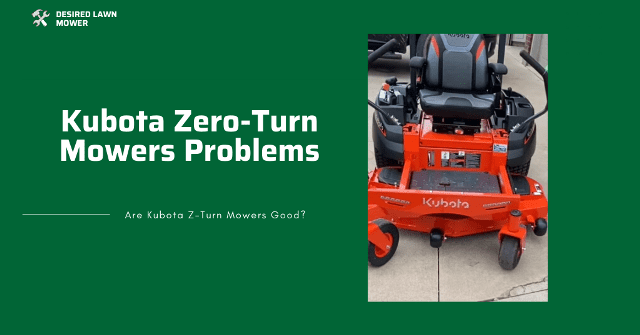
Every zero-turn mower brand has two sides to the game. Here are the problems you may face with Kubota zero-turn mowers:
1.Safety Switch Malfunction
This problem is usually caused by a faulty or loose clutch that interrupts the normal function of the safety switch. The safety switch plays a big part in starting the machine, and a faulty one will affect the process. This will most times be translated as the Kubota z-turn refusing to start or turning off abruptly.
2.Cheap Fuel Line Problem
The Kubota fuel line issue has frustrated a lot of its customers. The use of low-quality fuel lines that dissolve and burst is the major reason for the leakage and inability of the engine to function properly. So, for a machine that is properly power-equipped, you might start to wonder why it groans, squeals, and throws a fit at minimal tasks in the yard. A shortage of fuel for the right parts will overwork and stress the machine so much that little tasks become too overwhelming to perform.
3.Problematic Steering Handles
I simply cannot explain why this flaw even happens. In the long run, the handles of the mower will happen to get stiffer as you go without any reason or explanation, so much so that steering around becomes a little more difficult to put through. This problem isn’t experienced with ALL Kubota zero-turns, but it’s still highly attributed to the brand. I have concluded the issue to be from the manufacturers– perhaps they make a few changes on some of the models before sending them out to be sold warranting a mix of problematic and unproblematic steering handles.
4.Hydraulic Transmission Problems
The hydraulic transmission on Kubota zero-turns is highly infamous for leaking. Either the oil leaks out or air leaks in causing the mower to slow down a notch and later on even halt or simply refuse to start. The only solution to this is for the brand to invest in better quality transmission.
Should You Get A Kubota Zero-Turn Mower?
Considering all the distinct cons I have reviewed, I understand if you feel a little reluctance. The best way to balance your thoughts is by realizing that all brands have their distinct flops attributed to them, the difference is that some flops are simply appalling! However, for the inconvenience that comes with Kubota zero-turn mowers, they do offer a lot of satisfaction to compensate. So, I recommend that you purchase a Kubota– you’ve got little to lose and more to gain.
Are There Any Kubota Zero-Turn Alternatives?
In case the Kubota zero-turns don’t quite hit the nail for you, there are other brands that I’m sure will do. Here are three of my top recommendations that could appeal to your needs:
A More Comfortable Ride: Toro
Toro z-turns offer an immense level of comfort at a cheaper price in comparison to the Kubota and they share many similarities like speed and power. I suggest you look into this brand if the Kubota is rather too heavy for your budget. I have written a similar article reviewing the Toro zero-turns– you might need a clearer explanation.
A Ruggedly Built Alternative: Scag
If quality is a big deal to you, you might want to check on the Scag zero-turns. They are highly reinforced and offer reputable stamina similar to the Kubota. Aside from having a better-looking aesthetic, they also possess extra fun perks like double gas tanks for longer mowing hours without refilling every now and then.
A Cheaper Option: Ariens
The Ariens are best known for superb cut quality and cheap residential options. If you’re a beginner with a fair-sized yard that just wants a clean cut without any knick-knacks or trouble, consider checking out the Ariens zero-turn mowers.
The Verdict
Purchasing a zero-turn mower is no easy task. There are a lot of points to consider to settle on the best brand for you. I suggest you do your research and apply the knowledge to your yard and your preferences so that you get your money’s worth out of the right choice. Good luck!
